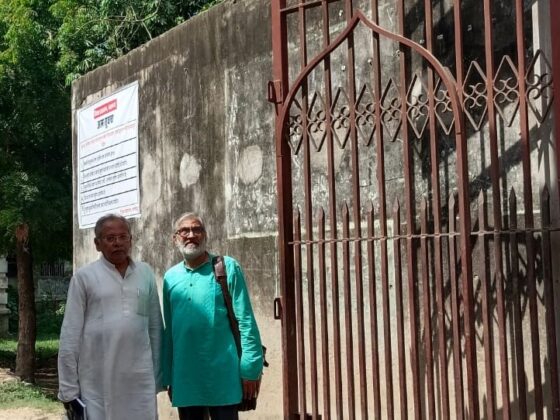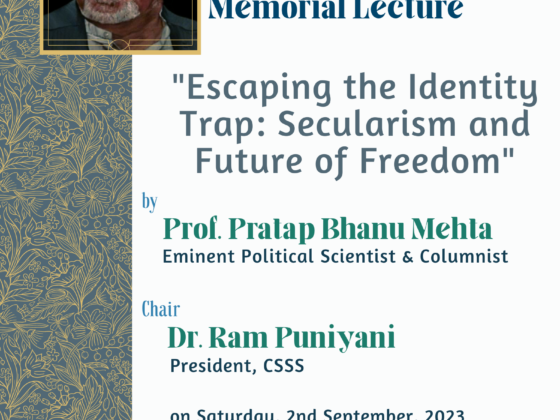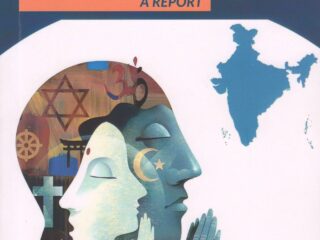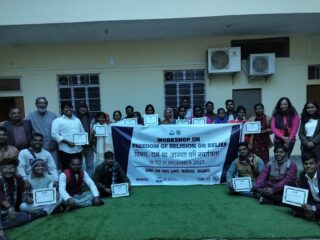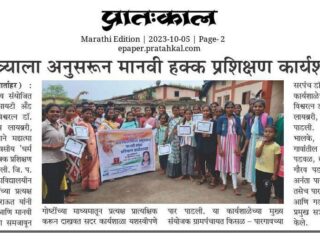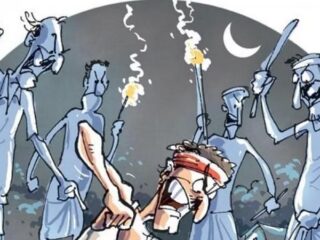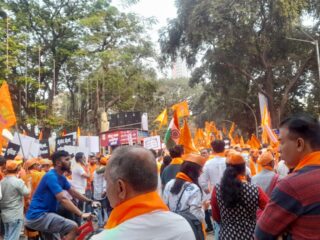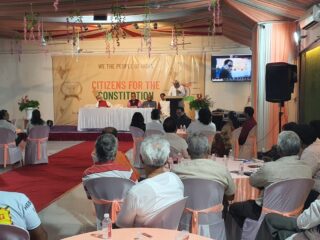Irfan Engineer
India is experiencing an escalation in religion based communal conflicts in recent times. In this conflict, Muslims and Christians are easy and more vulnerable targets of the state and non-state actors. The non-state actors target Muslims in what has come to be known as mob lynching for transportation of cows and other animals, and during communal riots attacking them physically as well as damaging their properties. They are being subjected to economic boycott, and demonized as a community having separatist mentality. They are accused of ill-treating their women through the instrument of unilateral divorce, practice of polygamy. Muslim community is accused of being regressive and fundamentalist, having little respect for the law of the land. Patriotism of Muslims is questioned, and they are demonised as terrorists. It is falsely alleged that their population is growing faster with the intention of becoming a majority community in India. Islam is targeted as an intolerant religion, which denounces non-Muslims as kafirs, with whom they must wage a violent holy war, including resorting to terrorism. The Muslim community is further being demonized as a community conspiring to wage ‘love jihad’ wherein Muslim men entice innocent Hindu girls into matrimonial ties with the intention to convert them to Islam and become a majority community. Some Muslims are also being demonized as illegal immigrants from Bangladesh. A section of Hindu extremists calls upon Hindus to wage a war against Muslims and push them out of Indian borders or even eliminate them. Some of the Muslim religious institutions are being reclaimed as structures built after demolishing Hindu temples and therefore they raise the demand for reclaiming them.
The state has done pretty little to punish the hate crimes against the Muslim community or to punish those guilty of indulging in mob lynching and communal riots. On the contrary, the state demolishes their homes for allegedly throwing stones on Hindu religious processions and launches prosecution against the victims of mob lynching for allegedly illegally taking cows to slaughter houses and holding them guilty of conspiracy to trigger off communal riots. In order to invisiblize cultural heritage associated with the Muslim community in north India, the state is on a spree to rename streets and railway stations which have Muslim sounding names. In Assam and J&K, the delimitation process is carried out in such a way as to make it more difficult for the community leaders to get elected, as their numbers get diluted in the constituency. In Assam, they have been evicted from their homes, disrupting their livelihoods and politically marginalising them.
It must be said here that Muslims alone are not being targeted by the Hindu nationalist politics, their ideology, and their violent and extremist cadre. Other marginalised communities are also being targeted to varying degrees, in different ways and on different grounds. The other targeted communities are the Christians, the Dalits, and the Adivasis. The OBCs are also being disadvantaged and marginalised. Women of all communities are being discriminated against by patriarchal structures within the community and with acquiescence of the state. The economic policies of the state have also ensured marginalization of the workers and peasants. However, in this article we are concerned only with the issues facing the Muslim community.
It must also be said here that all members of the Muslim community do not experience their marginalisation equally and are not equally vulnerable to targeted violence. Muslim women, the poor and the pasmanda Muslims (those converted to Islam from backward classes) suffer much more as their make shift homes are more vulnerable during riots; the livelihoods of daily wagers and casual workers are lost. Muslim women have been subjected to sexual assaults during riots. They also face domestic violence and face daily subjugation under patriarchal structures of state as well as communities.
How should the Muslim community respond to this conflict?
While the Hindu nationalist ideology sees the presence of the Muslim community as a threat to Hindu culture (which is in fact very diverse). They see the Muslim culture (which also is as diverse as the Hindu culture) as divisive. The presence of Muslim and Christian culture requires a political arrangement wherein the state is neutral towards, or equally distant from all religious practices and religious institutions. The Hindu nationalists believe that the state was crafted to be secular in order to accommodate the religious practices of the minorities. The Muslim and Christian minorities are an obstacle in creation of a Hindu state that enforces Hindu cultural practices and way of life.
Democracy and secularism are better options to a cultural or a theocratic state, even if the citizens of a country belonged to a single religion, spoke the same language or belonged to the same ethnic community or race. A theocratic state is an obstacle in evolution of religious practices and ideas. All followers of any given religion have diverse approach and understanding of their religion and need freedom to practice their religion in their own unique way, while the theocratic state enforces fossilized past understanding of religion, even while the society has evolved. Following and practicing any religion should come out of one’s own will rather than being enforced by the state, or any other institution. The laws and policies of the state should also be to promote the welfare of the citizens rather than confining the law-making process to looking into religious texts.
Now that the party which follows Hindu nationalist ideology is in power, having its political objective to recraft the state as a Hindu state, the Hindu nationalist cadres fearlessly resort to targeting the religious minorities, while the secular state is un-capacitated by those in power to take any action against them. Communal violence is an instrument to set a narrative wherein the Muslim community is demonised as disloyal to the nation, having separatist agenda, and practicing socially regressive and reprehensible culture like triple talaq. They are accused of conspiring to ring in and Islamic state.
Muslim political leadership:
The Hindu nationalists selectively use history, based on mythology, constructed on half-truths with the intention to demonise the Muslim community, instil fear of the community among Hindus and mobilize the might of the state and Hindus to subjugate the community. History is invoked to present the Hindus as victims of Muslim rule in the past and weaponised to seek revenge for the alleged past misdeeds of the Muslim rulers from the poor sections of Muslims who are hardly aware of the past. While a large number of Muslims fought against the British rule for freedom and faced the gallows and imprisonment, the community must also accept that there was a section of leaders who bargained with the colonial state for higher share in the political arrangement on the basis of political weightage. They argued that the British took power from Muslim rulers and therefore they were justified in demanding higher share in the power sharing arrangement vis-à-vis the Hindu community. As the transfer of power was becoming a certainty, Jinnah succeeded in instilling fear of the Hindu community and the future state among the Muslims, and rallied a large section of the Muslim elite behind his demand for partition. The community must atone for Jinnah’s call for direct action in the year 1946 and the communal riots that followed in Bengal and Punjab wherein more than a million people were killed.
Demonisation of the community by the Hindu nationalists has gained ground among the Hindus also due to the behaviour of the Muslim community as a contributory factor – both in the past, as well as in recent times. The spate of electoral successes of the Hindu nationalists makes it evident that the Hindu nationalists are succeeding in demonising the Muslim community. The community leaders deny their responsibility and strongly assert their Constitutional right to be culturally different and require separate laws without justifiable or good reasons. For example, Abu Asim Azmi, leader of Samajwadi Party in Maharashtra and Member of the State Legislative Assembly, recently thundered during the monsoon session in 1923 that he would not sing the national song – Vande Mataram. The defense of practice of instant and unmediated divorce by pronounciation of the word ‘talaq’ thrice as irrevocable, and the practice of nikah halala wherein if the husband wants to take back his divorced wife, she must first get married to another man and that man should divorce her after consuming the marriage are reprehensible. Even after the law against this unilateral divorce was passed, some Muslim leaders said that they would disregard the law and consider such a divorce as irrevocable in spite of the law.
While we need not be held hostage to history, the Indian Muslims need to accept their role and distance themselves from Jinnah’s politics, and indeed, communal politics of all hues and colours. In order to justify the separate electorates, the pre-partition Muslim League laid emphasis on their different culture. Jinnah famously argued that the two communities – Hindu and Muslim – were completely different, and they could not be yoked together under one state.
The Hindu community today is selectively reminded of the atrocities and violence inflicted on the Hindus that accompanied partition. The PM Modi’s Govt. has called upon the nation to celebrate 14th August (when Pakistan was created) as Partition Horrors Remembrance Day. In that human tragedy, both communities suffered. The Muslim community needs to acknowledge the atrocities and distance themselves from it, even condemn it. Muslims also need to distance themselves from the atrocities committed by the medieval Muslim rulers, particularly when Hindu temples had been demolished, even though it is a truism that Muslim peasants, labouring classes, service providers, and artisans (ajlaf Muslims) were as oppressed under the Muslim rulers, as non-Muslims, and the Hindu peasantry, labouring classes, service providers and artisans were oppressed under the Hindu landlords and rulers, and who were in service of the Muslim ruler.
There must be a campaign to educate the Muslim community about democratic governance and their rights as citizens seeking a meaningful political life with other fellow citizens. The community needs to distance itself from communal political leaders who thrive on creating an illusion among the community that they would defend the reprehensible and regressive practices based on patriarchal understanding of the holy Quran and protect the community. These leaders have utterly failed in the past and even in the present to ensure security of the community. Such communal leadership merely seeks to convert the community into ensured vote-banks that would enable their claim to leadership. They seek to promote homogenization of the Muslim culture, undermining the cultural diversity based on language, local traditions, customs, and there is social caste-based stratification. There is also sectarian diversity. The communal leadership seek to mobilize the community around cultural issues like defense of the Muslim Personal Law, promotion of Urdu as lingua franca of the community and issue of the Ummah like the Dutch cartoons and opposition to Salman Rushdie stepping in India, etc. They willy-nilly promote Arabization of Indian Muslims in league with sectarian religious leadership.
The community must take a lead to demand state structures, institutions and laws that would protect all citizens from targeted violence, irrespective of religion, caste, region, ethnicity, language or region. The community should demand reparation policies of international standards that ensure non-recurrence of targeted violence – whether on religious minorities, caste or linguistic communities. Instead of the political demand to be treated exclusively with special laws, we should seek just and democratic laws that protect all and work for all. That would ensure alliance of all those who are subjected to targeted violence – Dalits, religious and linguistic minorities, etc. The other institutions that would strengthen democracy and also work for all marginalised and discriminated sections of the society include an ‘Equal Opportunity Commission’; and compilation of ‘Diversity Index’. Religious and linguistic minorities, Dalits, women, other backward classes, all are discriminated against and an mobilization of social alliance of these marginalised communities would go a long way neutralizing the communal propaganda of the Hindu nationalists.
The Muslim community must look inward acknowledging their failures and emphasis on wrong issues as well. Democratic consciousness promoting equal citizenship, dignity of all citizens, particularly of the women within the family, within the community, and justice. Take lead in mobilising all citizens for governance accountable to the citizens, rather than exclusive rights and separate treatment for the community.
The Muslim community is facing four major challenges – 1) it’s image or persona as a community, which will resist integration into the “nation”; 2) economic and social backwardness and 3) continuous dialoguing with other religious communities to promote better understanding about the community, understand other religions and journey together to arrive at a higher truth; and 4) how to respond to continuous provocations from the Hindu nationalist cadres and religious extremists through abusive slogans and insults.
1) Image of the community:
As mentioned in the previous article, the Hindu nationalists strive to popularize the perception about the Muslim community, with some degree of success (particularly in North India), that they are religious fanatics, who can be easily identified from their outer appearance like the clothes and head gears they wear. There is a weak but growing trend of Muslim men wearing Arab kaftan on festive occasions. The Tablighi Jamaat propagates that Muslim men should wear their trousers/salwars a few inches above their ankle. Muslim men are often seen offering namaz on streets, particularly on Fridays. There are conflicts in some housing societies on the issue of animal sacrifices during the Muslim festival of Eid ul-Adha. The early morning azaan, or call for prayers, from multiple mosques is another irritant to some people – Muslims and non-Muslims. We could list some issues wherein some Muslims seek to reform their behaviour influenced by Islamic teachings from Arab lands. Muslims see this as Islam compliant behaviour. While they are within their constitutional rights to do so, and non-Muslims must also gratuitously accept the choices of those individuals, we aren’t living in an ideal world wherein all citizens understand democracy and accept each other’s free choices. Non-Muslims perceive such a behaviour, particularly adoption of Arab fashions and flowing beards as turning away from “Indian” traditional culture. Some are curious, while others are hostile towards such behaviour.
The Tablighi Jamaat movement asks Muslims to give up certain syncretic religious practices like the tazia processions during Moharram, in which Hindus also take part. Hindu women traditionally do arti of the tazia and in certain regions, they pass their new born child under the tazia as a blessing for the child. Many Muslim individuals too enthusiastically participate in Durga Puja in Eastern India, Ganeshotsav in Maharashtra, and in other Hindu festivals – not for worship sessions, but cultural performances associated with these festivals. There are hundreds of dargahs all over India where the sufi saints were buried. These dargahs are visited by Hindus and Muslims. Many dargahs their dargahs with annual urs processions in which Hindus and Muslims both take part together. The Tablighi Jamaats and the Wahabis campaign amongst the Muslims to give up such religious practices as anti-Islamic.
Muslim community is also perceived as a community ill-treating their women with the practice of polygamy, triple talaq, forcing them to wear hijab, and even naqab (face veil) so that only their eyes are seen. Of course, these are perceptions and it is not the contention of this author that they are justified and true. There are many dimensions behind these perceptions and the truth in some cases may be the opposite.
These perceptions must be addressed. There are two ways in which these perceptions can be addressed – firstly by introspection and self-correction wherever necessary, and secondly by developing mechanisms and platforms for dialogue to correct the wrong perceptions. If the perceptions are not corrected, it would be open to the Hindu nationalists to exploit them in order to communally polarize the society.
While the Muslim clerics are more in favour of status-quo and tend to support Islamization, Muslim intellectuals must take a lead and do ijtihad as the great Urdu poet and philosopher Dr. Mohammad Iqbal called upon – wherein the message of Quran exegesis is undertaken to make it relevant to our times. Ijtihad is essential aspect of religious life. What distinguishes humans from other species is the rational faculty and abilities. Each generation must undertake Quranic exegesis to make the message meaningful in their context. Sir Syed Ahmad Khan, Maulana Shibli Nomani, Maulana Abul Kalam Azad, and many other Muslim intellectuals and Islamic Scholars have re-contextualised the Quranic teachings. Dr. Asghar Ali Engineer, an Islamic scholar wrote volumes on gender justice in Quran. Dr. Engineer also propounded that the Quranic message is the values of peace, compassion, service to the humanity, love, acceptance of cultural diversity, social justice, equality, human dignity, and pursuit of truth. He stood for rational approach to Quran and not taqlid or imitation or following the established jurisprudence. He passionately worked for reforms, particularly to stand for the rights of women in Quran. Muslim Intellectuals must summon courage and undertake ijtihad and lead the community forward and guide them in their akhlaqs. Muslims at the least, must ensure that as a community they cause least nuisance value and trouble no one while practicing their religion. They must revisit the issue of Azaan, religious processions, site of animal sacrifice during Eid al-Adha and Friday prayers. While practicing religion, the composite culture and syncretic religious traditions must be embraced and welcomed. The only religiously prescribed dress code for the faithful in Islam is not to exhibit their ornaments and cover their private parts.
The Muslim community should come across as a community that serves the people of India through its educational institutions, hospitals, health services, social services during natural disasters and render numerous other services for the people of India. Anjuman-i-Islam, Muslim Education Society in Hyderabad and Kerala, Jamia Milia, Aligarh Muslim University, are some educational institutions that render service to all, however, they are far fewer than what the community should ideally have. There are even fewer hospitals and health services. Jamat-i-Islami has the tradition of helping people during the natural disasters. They did good work during the earthquake in Kutch on 26th January 2001 and relief work during floods and communal riots.
We would like to mention here the work of Khudai Khidmatgar, inspired by the Gandhian freedom fighter Khan Abdul Gaffar Khan. Faisal Khan heads the organisation and is ever ready to serve the people, including non-Muslims with the limited resources that they can muster.
2) Addressing economic and social backwardness of the Muslim community
The Sachar Committee Report as well as the Amitabh Kundu Committee report has brought out the social and economic backwardness of the community on account of their discrimination. A lot has been written and commented about and we do not propose to repeat all the findings here. Briefly, the report brings out the fact that the Muslim community lags behind in educational achievements, lags in government and public sector jobs on account of discrimination. The community is also discriminated in extension of infrastructure like roads, water connections, garbage collection, sewage, and other public conveniences in the minority concentrated areas. They are discriminated in loans provided by the public sector banks, government contracts and government schemes.
However, discrimination does not impact uniformly. The Pasmanda Muslims who constitute more than 85% of the community suffer graver consequences of the discrimination. Unlike the Ashraf Muslims (upper-caste converts and those who claim noble lineage), the Pasmanda Muslims face livelihood issues, work as poorly paid artisans, daily wage labourers, push-cart hawkers and with lower literacy rates and educational achievements than the Ashraf Muslims. There is much higher prevalence of child labour among them, whether in the bangle industry in Faridabad, carpet weaving, zardosi embroidery work from Bengal, construction labour, or other unorganized sector. Most Muslim politicians, Waqf Board members (who control community’s properties like mosques and madrasas) and religious leaders are from the Ashraf community and they tend to focus on religious identity and emotional issues that keep the entire community united as their followers.
The Pasmanda Muslims on the other hand need the state to address the issues of universal and subsidised education, employment opportunities and livelihood, affordable housing, access to health infrastructure and other secular existential issues to be addressed as their first priority. The Pasmanda Muslims of late have been organizing and asserting themselves to demand inclusion within SC category if they are converts from Hindu Scheduled castes and are forced to do similar work; and in OBC category if they are converts from corresponding Hindu castes and extension of affirmative actions like reservations. The Ashraf political and religious leadership does not support this demand of the Pasmanda, as they deny that there is any caste-based stratification or inequality within Islam. In Islam all believers are equal before God. However, caste based social stratification and discrimination within the community as well as by the society in general is a reality. If the fellow community members get the benefit of affirmative action on the principle of social justice as they are victims of discrimination, as other non-Muslim castes do, why should the Ashraf leadership not support them? They are reluctant as that would tantamount to admission of them following practices denounced in Islam. However, that is a reality which has been brought out in a number of sociological studies. The Sachar Committee Report also recommends affirmative actions on the basis of socio-religious categories, not treating the entire Muslim community as one unstratified community. The Ashraf leadership is also apprehensive that demanding affirmative action on the basis of caste-like stratification within the Muslim community would fragment the community into various caste-based biradaries (kinships) and open to the possibility of being mobilised by other SC and OBC political leaders deepening that identity, and consequently, weakening communal identity. Their political objective of uniting the community under their leadership to defend the Muslim Personal Law and reinforcing cultural markers that distinguishes the community from other religious communities would be in jeopardy. The Ashraf leadership demands reservations for the entire community and not for the Arzals (converts from the SC communities) and Ajlafs (converts from OBC castes). This demand of communal reservation in jobs and educational institutions was accepted in some states, including the united AP but was struck down by the Supreme Court as un-Constitutional.
The community must accept that there is social stratification and caste-like discrimination within the community must to acknowledged and addressed in order to strive and establish social order based on equality and compassion for the most vulnerable and needy within the community in particular and in entire society in general in accordance with Islamic teachings. However, in order to achieve that objective, the community must demand that the Indian state’s obligation towards the OBCs and SCs must also be extended to the Muslims in so far as they are applicable. The community must also demand that the 1951 Presidential order be amended to allow the castes from the Christian and Muslim and all other religious communities also to be included in the Scheduled Castes category if they meet other criteria necessary for such categorisation. Launching a peaceful and democratic movement for inclusive approach to social justice and affirmative action should endear the community to other forces that advocate social justice.
Alongside the struggle for inclusive approach to social justice, the community must have a strong programme to encourage education within the community through extra coaching, scholarships and financial support to the students. The community must run a campaign to ensure that all children are admitted to schools for primary and secondary education and desist sending them for apprenticeships or labour jobs. The community must also ensure reduction in dropout rates and encourage education till graduation/post-graduation and professional courses. At present the religious as well as the political leadership within the community almost exclusively emphasises on meeting religious obligations. The emphasis is on building mosques, community halls, haj pilgrimage and feeding the poor during the month of Ramzan to enable them to fast during the holy month. Those who have means and can afford, go on pilgrimage multiple times. If the religious leadership makes the community members aware of their obligations as well, including education, during the sermons on Friday, and encourage members to contribute towards ensuring that every Muslim child is educated and ensure that talented high achievers don’t have to give-up for lack of financial support. The pride that a Muslim with means feels on performing Haj, can also be made to feel the same pride for supporting educational programmes. The community must start more educational institutions, health centres and other services.
Though some Madrasas impart modern education along with religious education, the community must ensure that all Madrasas teach mathematics, sciences, computer sciences, geography and other subjects as well. Christians, Jains, Buddhists and Sikhs, though much less than 1/7th of the Muslim population, have more educational institutions, hospitals and health services than Muslims. The community can ensure better returns on the Waqf properties and good use of zakat funds to achieve these objectives.
3) Inter-Religious dialogue
In order to promote better understanding among various religious communities and counter stereo-typical image of Muslim community, there should be several inter-religious dialogue fora throughout the country. There should also be fora to promote intra-religious dialogues. The I-R dialogue should welcome diversity of religion and cultural pluralism. Continuous and manifold inter-religious dialogue networks should help overcome communication gaps between the communities and better understanding about each other’s different religio-cultural styles, if any religious practice by one community causes inconvenience or offends other communities and how such practices should be addressed/accepted or avoided. The network of I-R dialogue should also oppose manifestation of religious extremism within all communities.
The I-R dialogue can be at three levels – 1) dialogue of life, wherein the discussions can be focussed on how do we come together to address common issues facing all humans in their everyday lives, including measures at individual levels to check climate change, humanitarian situations wherein some needy may be requiring help during natural disasters, manmade disasters and accidental situations arising, cleanliness of the area, addressing environmental degradations, etc. and other everyday problems faced in the neighbourhood; 2) dialogue of action wherein communities come together to address structural and systemic injustices that disadvantage a section of population and 3) theological dialogue wherein we help each other enrich and refine their theological understanding.
I-R dialogue can also help identify the common values and ethical basis within all religions and shared composite culture – e.g., language, cultural practices and traditions. The continuous and ongoing dialogues can help the communities understand how the shared culture has contributed to and mediated our understanding of religion.
4) How should Muslims respond to provocations and insults
It has become a modus operandi of a tiny section of Hindu nationalists to infiltrate traditional Hindu religious processions, hide behind these processions and shout provocative political and abusive slogans while passing through Muslim dominated areas or in front of a mosque. The intention is that some Muslim youth is likely to get provoked and react by throwing stones on the procession. The Centre for Study of Society and Secularism (CSSS) has studied number of communal riots that were triggered off when the Hindu nationalists insisted on deviating from the mutually agreed route to be taken by a Hindu religious procession and pass through a Muslim dominated area playing loud Music while the procession is passing a mosque, particularly during their prayer time, and even shouting abusive and political slogans. Some Muslims who either come out of their prayers to request to turn down the volume of the DJ and at times, some Muslim youth have even thrown stones in response to the abusive slogans. The Hindu nationalists who have infiltrated the religious procession, often come prepared for rioting in the eventuality of their provocation succeeding and some Muslim reacting by throwing stones at the procession, as various reports about the communal riots in Nuh on 31st July 2023 show.
The Muslim community must practice utmost restraint in such situations and no matter what the provocation may be, they must not react in any manner. Often Muslim organisations and Mosque committees have welcomed the traditional Hindu religious processions, at times by offering drinking water or soft drinks or even snacks to those in the religious processions. That is a good practice, which must be continued and other Muslim organisations must emulate such good practices. Secondly, Muslim youth or those known to have short temper must be kept behind and elderly people with wisdom and sobriety must be in the front while the religious procession is passing by. In case of any untoward behaviour or activity in any segment of the riot, the only response should be to document and video graph such activity/behaviour. Later, after the procession is over, criminal prosecutions must be initiated with the help of lawyers to ensure that the violators of law are brought to justice. The criminal prosecutions may demand utmost perseverance and take time, but it will restore the faith of the community in the legal and Constitutional mechanisms. Hot-headed community leaders must be counselled that reaction to provocation is precisely what is desired by those who are playing loud music and shouting abusive political slogans and the community should not fall in their trap. The community must be counselled to ensure that no one resorts to violence or violation of any laws. If some unjust and undemocratic laws are passed, then the protests should be withing the Constitutional framework and peaceful, more to draw public attention toward their displeasure than to inconvenience people.
The Muslim women’s sit in agitation to protest against the discriminatory and un-Constitutional Citizenship Amendment Act, 2020 at Shaheen Baugh in Delhi within the democratic framework is an example to emulate. Hundreds of Muslim women occupied public streets for days together demanding repeal of the law. The iconography of the protest site was map of India, preamble of the Constitution, political leaders from all castes, communities, regions, who stood for the oppressed and democratic rights, and the freedom fighters. Women controlled the dais and spoke about democratic rights, communal harmony and peace. In spite of several violent attempts to evict them, stigmatize them, divide them, use coercive force, they persisted and sustained their agitation for days and months together. Shaheen Baughs emerged in several state capitals and towns in India. They behaved responsibly by withdrawing their movement only when covid-19 restrictions were imposed to check the spread of the deadly virus.
Often the religious processions are preceded by peace committee meetings called by police and leaders of all religious groups are invited. In the peace committee meetings, there should be a demand for adequate police force, that the entire procession should be video graphed by the police and that the police should ensure that no one in the procession are allowed to carry any arms or staffs.
The community must strengthen the human rights and civil liberty organisations that work to protect democratic and human rights. The civil liberty organisations document violations of human rights, intervene however possible to protect rights of the citizens, and petition to the constitutional courts to ensure that the state is directed to protect rights and take remedial measures whenever they are violated. Some Muslim organisations / individuals have sponsored civil liberties organisations to address violations of rights of Muslims who are arrested arbitrarily, secure bail for them, carry out fact-finding, and petitioning constitutional courts. However, it would be more desirable to strengthen civil liberties organisations that exist and persuade / enable them to defend the rights of Muslims as well. Particularly those civil liberties organisations that prioritise defending the rights of all oppressed and marginalised people, including the Dalits.
The community would also be known through its achievers in performing arts, sports, educational fields, scientists, civil servants and bureaucrats that have contributed through their honourable services. The community needs to nurture talents and encourage achievers by investing in their coaching and encouraging them in numerous ways. At times, however, Muslim religious leaders tend to pull down and disown their achievers judging them on their dress code and impose strict adherence to their religious practices. Salman Khan was made controversial for his celebration of Ganeshotsav; Sania Mirza was problematized for her shorts that she has to wear during her tennis matches like any other sports person. Indian Muslim community has produced many great achievers, including Bismillah Khan, the shehnai player, Bade Ghulam Ali Khan, Amjad Khan, and many great musicians; cricketers like Pataudi, Azharuddin, Irfan Pathan. The list would be very long, including many freedom fighters, Sufi saints, and these achievers have made all Indians proud, along with all Muslims as well.
What has been suggested above is a small action plan as to what should the Muslims do. This can be further enriched by many others working for the community. Hope these broad suggestions functions as starting point of some sort of discussion. The community leaders and a section of Muslim intellectuals too emphasise on building unity within the community. We feel that the desire of unity somehow, will not take the community towards that goal. There are political differences, denominational differences and cultural differences. These differences cannot be overcome for the desired unity of the community. What is desirable is that we steer in the right direction – to establish a society free from inequalities, where justice prevails, where the society works for the empowerment and fulfilment of needs of the most needy, where freedom of religion (including the beliefs of atheists) is respected, protected, and promoted, where dignity of every human being is upheld, where all citizens are enabled to participate equally in governance and the government is accountable to the citizens and transparent in its functioning. This should enable unity not only of Muslims, but unity of all citizens to defend democracy and human rights.

